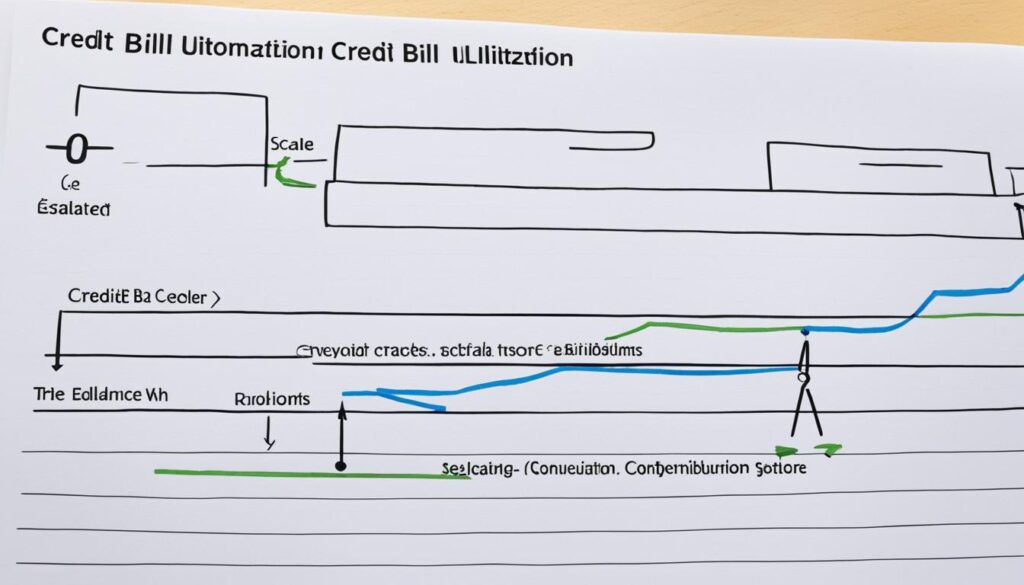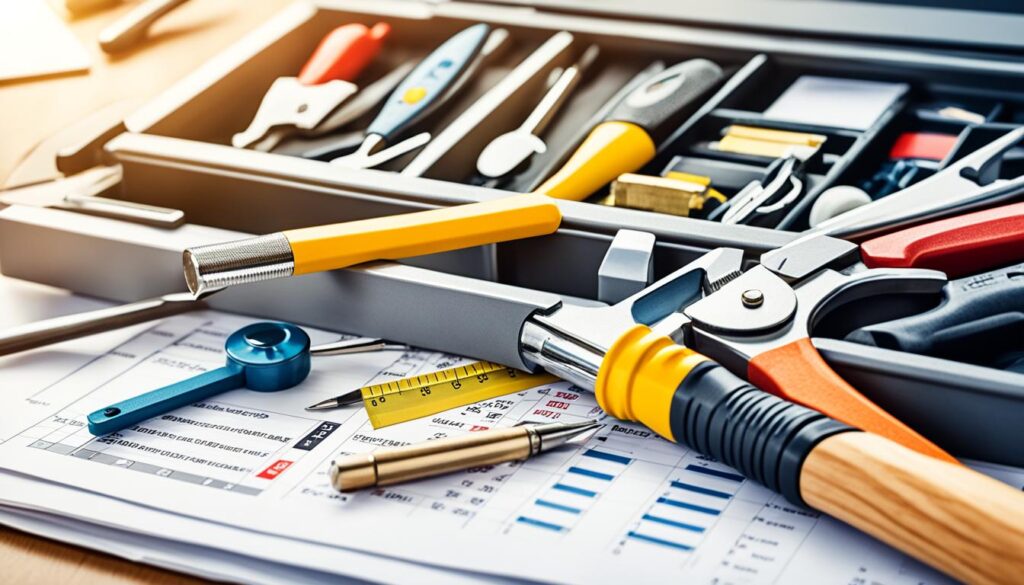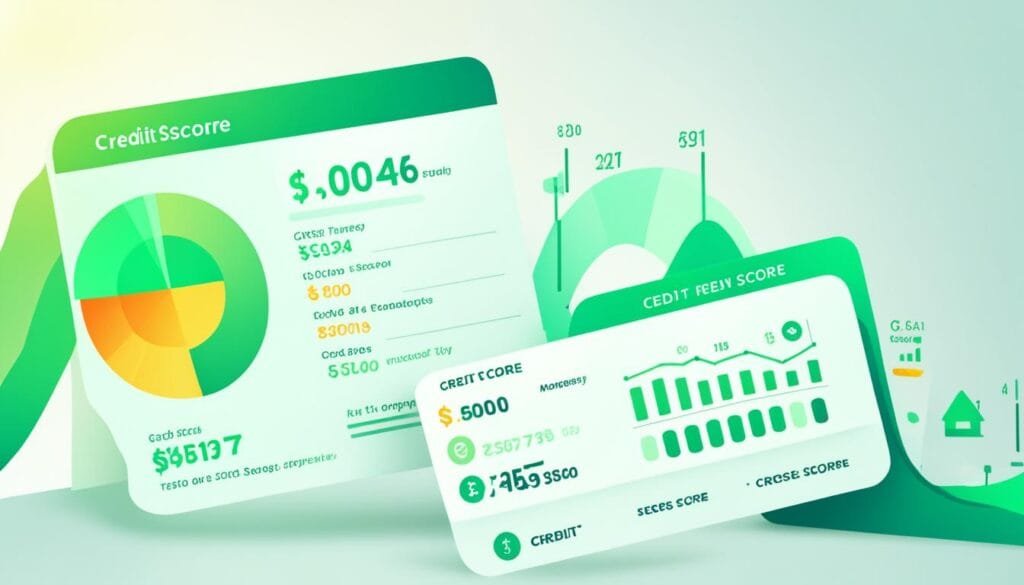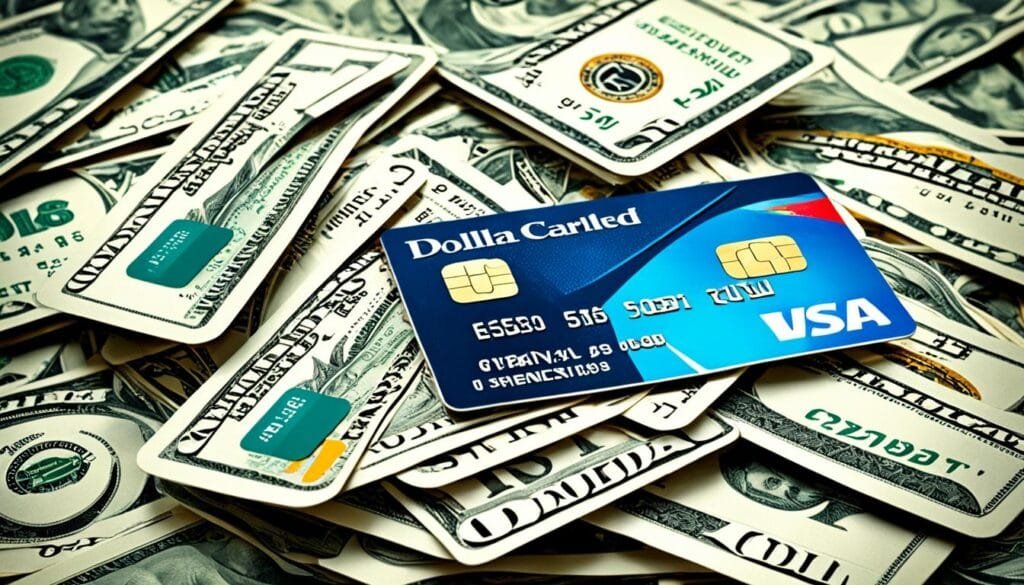Establishing a solid credit history is essential for financial success. Your credit history and credit score play a significant role in determining your access to credit, loans, and other financial opportunities. By building a strong credit history, you can demonstrate your creditworthiness and open doors to better financial options.
Building credit requires responsible financial decisions and consistent actions. It’s a gradual process that requires patience and discipline. To help you on your credit-building journey, here are some tips to consider:
Key Takeaways:
- Start early by applying for a store charge card or credit card.
- If you don’t qualify for a regular credit card, consider a secured credit card or find a co-signer.
- Pay your bills on time and maintain a low balance-to-limit ratio on your credit cards.
- Practice good credit habits and monitor your credit reports regularly for errors.
- Building credit takes time and responsibility, but it’s worth the effort for better financial opportunities.
Start Early and Start Small
Starting early is key to building a strong credit history. The length of your credit history plays a significant role in determining your credit score. By establishing credit at a young age, you give yourself more time to build a positive credit history, which lenders take into consideration when evaluating your creditworthiness.
To start small, consider applying for a store charge card or credit card. These types of credit accounts are often easier to obtain for individuals who are new to credit. Keep in mind that it’s important to use credit responsibly and live within your means. Lenders may view multiple credit applications in a short period as a potential risk, so it’s crucial to demonstrate that you plan to use credit wisely and manage your finances responsibly.
In the words of financial expert Suze Orman, “A low credit score is not a lifetime sentence. Start small and take steps to build credit gradually.”
Consider Secured Credit Cards and Co-Signers
If you don’t qualify for a regular credit card, there are alternative options available to help you establish a credit history. One effective option is to open a secured credit card. With a secured credit card, you’ll need to provide a refundable security deposit that serves as collateral for the credit limit you’re given. By using your own funds as collateral, the card issuer can feel more secure in offering you credit, even if you have no credit history or a low credit score. As you make timely payments and demonstrate responsible credit behavior, your credit history and score will start to improve.
Another possibility to consider is having a co-signer on your credit card or installment loan. A co-signer is someone with an established credit history who agrees to take responsibility for the debt if you default. This can be a great option if you need to borrow money or obtain credit, but your credit history is not strong enough to qualify on your own. It’s important to have an open and honest conversation with your co-signer to ensure they understand the responsibilities involved.
Additionally, becoming an authorized user on someone else’s credit card can be a way to build your credit history. You’ll be able to make purchases using the primary cardholder’s account, and their payment history will be reported on your credit report as well. However, it’s crucial to use this option responsibly and ensure that the primary cardholder is also responsible with their credit. As an authorized user, any negative behavior or missed payments by the primary cardholder could negatively impact your credit history.
Pros and Cons of Secured Credit Cards, Co-Signers, and Authorized User
| Option | Pros | Cons |
|---|---|---|
| Secured Credit Cards |
|
|
| Co-Signers |
|
|
| Authorized User |
|
|
It’s important to carefully consider the pros and cons of each option and choose the one that aligns best with your financial situation and goals. Remember, building a credit history takes time and responsible credit behavior. To make the most of these options, be sure to make timely payments, keep your balances low, and practice good credit habits.
Pay Bills on Time and Maintain a Low Balance-to-Limit Ratio
Paying your bills on time is crucial for building a strong credit history. Unpaid bills, including credit card bills, medical bills, and utilities, can negatively impact your credit score. To avoid late payments, set up automatic bill payments or reminders to ensure you never miss a due date.
Additionally, it’s important to maintain a low balance-to-limit ratio on your credit cards. This ratio, also known as credit utilization, compares the amount of credit you’re using to the total credit available to you. Keeping your credit utilization below 30% is generally recommended for a healthy credit score.
Manage your credit utilization wisely
Here are some tips to help you maintain a low balance-to-limit ratio:
- Regularly monitor your credit card balances and keep them as low as possible.
- Prioritize paying off high-interest debts to reduce your overall credit card balances.
- Consider increasing your credit limit to improve your balance-to-limit ratio, but be cautious not to accumulate excessive debt.
Benefits of paying bills on time and maintaining a low balance-to-limit ratio
Paying bills on time and keeping a low balance-to-limit ratio can have several advantages:
- Positive impact on your credit score: Timely bill payments and a low credit utilization ratio demonstrate responsible financial behavior, which can boost your creditworthiness.
- Lower interest rates on credit cards and loans: Lenders view individuals with good credit habits as less risky and may offer lower interest rates on credit cards, mortgages, and other loans.
- Increased access to credit: A strong credit history can make it easier to qualify for credit cards and loans, allowing you to take advantage of better financial opportunities.

By paying bills on time and maintaining a low balance-to-limit ratio, you can improve not only your credit score but also your overall financial health.
Practice Good Credit Habits and Monitor Your Credit Reports
To build a strong credit history, it’s essential to develop good credit habits and regularly monitor your credit reports. By following these practices, you can improve your credit scores, maintain a healthy credit profile, and identify any errors or discrepancies that may affect your creditworthiness.
Make Payments on Time
One of the most important credit habits is making payments on time. Late or missed payments can significantly impact your credit scores and make it difficult to establish a positive credit history. Set up reminders or automatic payments to ensure you never miss a due date.
Keep Your Credit Utilization Low
Credit utilization, or the amount of credit you’re using compared to your total credit limit, plays a significant role in your credit scores. Aim to keep your credit utilization below 30% to demonstrate responsible credit management. Paying off balances in full or keeping them low can help improve your creditworthiness.
Avoid Multiple Credit Applications
While it may be tempting to apply for multiple credit cards or loans, this can negatively impact your credit history. Each application results in a hard inquiry on your credit report, which can lower your credit scores. Instead, carefully consider your credit needs and apply only when necessary.
Regularly Review Your Credit Reports
Monitoring your credit reports is crucial for identifying any errors or discrepancies that could affect your creditworthiness. You can request free copies of your credit reports from the three major credit bureaus annually. Review them carefully to ensure all information is accurate and report any inconsistencies promptly.
“Regular monitoring of your credit reports allows you to catch any inaccuracies that may negatively impact your credit scores. By staying vigilant and proactive, you can maintain a strong credit profile and resolve any issues before they become significant hurdles.” – [Expert Name], Financial Advisor
By practicing good credit habits and regularly monitoring your credit reports, you can take control of your financial health and improve your creditworthiness. These credit-building tools will help you establish a positive credit history and open doors to better financial opportunities.

What are the essential tips for building a strong credit history for a mortgage?
When it comes to getting approved for a mortgage, having a strong credit history is crucial. To build a solid credit profile, start by paying bills on time, keeping credit card balances low, and avoiding new debt. These essential tips for building credit will help you qualify for a mortgage with favorable terms.
Conclusion
Establishing a strong credit history is essential for individuals seeking to build credit and improve their creditworthiness. By following these tips and practicing responsible financial habits, you can pave the way for a solid credit foundation.
Remember to monitor your credit reports regularly to ensure their accuracy and identify any potential errors. Seeking guidance from a professional advisor can provide personalized advice tailored to your individual circumstances.
With determination and responsible actions, you can unlock the secrets to establishing credit history and open doors to better financial opportunities. Building a solid credit history takes time, but the rewards of improved creditworthiness are well worth the effort.
FAQ
Why is establishing a credit history important?
Establishing a credit history is important because it can impact your ability to secure loans, credit cards, and even rent an apartment. It can also affect the interest rates you are offered and your overall financial opportunities.
What is the best way to start building a credit history?
Starting early is key to building a strong credit history. Consider applying for a store charge card or a credit card and using it responsibly. It’s important to show that you plan to live within your means and make wise financial decisions.
What options do I have if I don’t qualify for a regular credit card?
If you don’t qualify for a regular credit card, you can consider opening a secured credit card. This type of card requires a security deposit, which serves as collateral to establish your credit history. Alternatively, you can have someone co-sign your account or installment loan. Another option is to become an authorized user on someone else’s account, which can help build your credit history over time.
How important is it to pay bills on time for building a credit history?
Paying your bills on time is crucial for building a strong credit history. Unpaid bills, including credit card bills, medical bills, and utilities, can negatively impact your credit score. Make it a habit to pay your bills on time to demonstrate your responsible financial behavior.
What does maintaining a low balance-to-limit ratio mean and why is it important?
Maintaining a low balance-to-limit ratio means using less of your available credit on your credit cards. It’s important because it helps raise your credit score and shows that you manage credit responsibly. Keeping your credit utilization low can positively impact your credit history and improve your creditworthiness.
What are some good credit habits to practice for building a strong credit history?
Some good credit habits to practice include making payments on time, keeping your credit utilization low, and avoiding multiple credit applications in a short period of time. It’s also important to regularly review your credit reports for errors and discrepancies and monitor your credit scores to track your progress.

